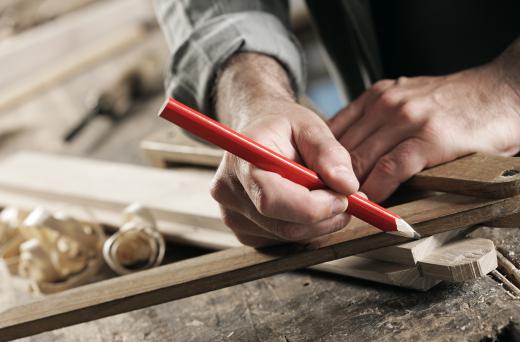Finish carpentry is the carpentry performed at the end of a building job; the finishing touches, as it were. Generally, it includes any carpentry which will be visible when the project is complete, in contrast with the rough carpentry which is covered up during the building process. Finish carpentry requires special skills and a very good eye for detail, and an experienced finish carpenter can be in very high demand.
Building or remodeling any structure is done in a series of stages. At each stage, different specialists may be involved, making sure that the work is done properly, and protecting the structural integrity of the building. Finish carpenters come in at the end of the job, when everything is in place and installed and it's time to apply the last details. These professionals make sure that everything is finished off and that the project looks aesthetically pleasing.

Finish carpentry includes things like trim, molding, and installation of hardware such as doorknobs, drawer pulls, and so forth. It can also include roofing, including the finishing touches on the roof such as gutters and trim. Essentially, if it's going to be visible for the life of the structure, it is considered finish carpentry. The finish carpentry consists of all of the fine details which laypeople notice when they look at a structure.

As with regular carpenters, finish carpenters need to be competent builders, but they also need aesthetic skills. They must be able to place items evenly and accurately, because they will be visible in the future. Things like matching of colors, sizes, shapes, and patterns are especially critical. When things don't quite match in rough carpentry, it's acceptable, as long as they are solid. When they don't match in finish carpentry, it's a problem; if, for example, the baseboards on one wall are slightly smaller than those on another, it's going to be a glaring and potentially very irritating problem.
People learn finish carpentry by starting out in rough carpentry, learning about the basics of carpentry, getting comfortable with tools, and gradually learning more advanced skills. Eventually, they are allowed to work on minor finish projects, and as they develop competence, they are assigned to more challenging and complex tasks. Some finish carpenters come from a woodworking background, with experience making things like fine furniture, while others may start out as basic carpenter's apprentices, building their skills from scratch with the assistance of skilled and patient mentors.
Ever since she began contributing to the site several years ago, Mary has embraced the exciting challenge of being a About Mechanics researcher and writer. Mary has a liberal arts degree from Goddard College and spends her free time reading, cooking, and exploring the great outdoors.

